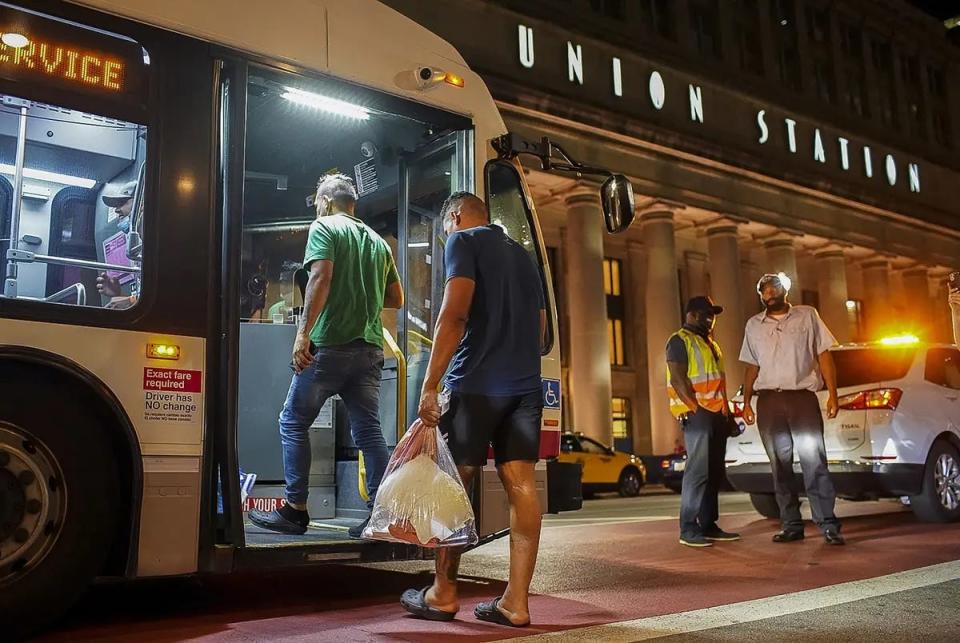Chicago moves to vaccinate people amid migrant shelter measles outbreak
Chicago health officials are rushing to vaccinate community members amid a growing measles outbreak in the city's largest migrant shelter.
By Wednesday afternoon, the Chicago Department of Public Health had reported 15 cases, mostly from a migrant shelter in the city’s Pilsen neighborhood, southwest of Chicago's Loop.
The outbreak is one of the nation's largest this year and the city's first since 2019. The U.S. and the world have seen increases in cases of the highly contagious yet preventable disease amid drops in the uptake of measles, mumps and rubella vaccine. The shelter cases have prompted an outcry over conditions inside crowded migrant shelters. They also sparked a new wave of anti-immigrant rhetoric about foreign people bringing disease.
City health officials haven't yet established the outbreak's origin. But officials said the cases aren't linked to international travel, including by migrants who recently crossed the southern U.S. border before arriving at the shelter.
“This did not come with those newly arrived in the city, either,” Dr. Olusimbo 'Simbo' Ige, the city commissioner of public health, said in a briefing Wednesday afternoon. “This means that measles is circulating in our city. And it’s why we are putting the call out for everyone who is at risk to protect themselves now.”
Global, national outbreaks: What is measles? Is it dangerous? What to know about symptoms, vaccines amid recent outbreak

While the U.S. saw 58 cases in all of 2023, the Centers for Disease Control and Prevention reported Monday there have been 58 cases through mid-March. Officials linked 93% of U.S. cases to international travel. It is transmitted in these cases when unvaccinated people travel abroad and return to the U.S. with the disease.
While the measles outbreak spread in a migrant shelter, the disease can easily spread to other congregate settings. It can remain in the air for up to two hours after an infected person leaves the room.
“If there’s even a small number of people in that area that are susceptible to measles, introducing one case can result in pretty efficient spread to all of those non-immune individuals in that space,” said Dr. Larry Kociolek, who teaches pediatrics at Northwestern University Feinberg School of Medicine and oversees preparedness, prevention, and response for the Ann & Robert H. Lurie Children’s Hospital of Chicago.
Chicago health officials confirmed the shelter's first case in early March, in a non-school age child who recovered and is no longer infectious. To date, there have been eight cases among children 4 and younger, as well as five cases of people between 18 and 49, city data showed.
Chicago has taken in nearly 40,000 migrants, many of whom arrived in the Democratic-led city on buses sent by Republican Texas Gov. Greg Abbott. Chicago leaders have since moved to evict migrant shelter residents due to lack of resources, they said.
The Pilsen shelter – located in a converted warehouse near the Dan Ryan Expressway – housed nearly 1,900 people, with as many as 2,500 migrants at one point. In December, a 5-year-old Venezuelan boy living in the shelter died from sepsis following a complication from the bacterial infection that causes strep throat.
Last week, city health officials said they vaccinated about 900 people in the facility, and confirmed immunity for the rest. Health officials say they plan to vaccinate migrants at other facilities as well. The CDC also sent a team to support the city’s efforts. Going forward city officials said all new arrivals must be vaccinated or show proof of vaccination.
Fewer hours, fewer flowers: Denver's migrant crisis threatens to overwhelm its compassion
Dr. Evelyn Figueroa, a local family medicine physician who runs a nonprofit food pantry in the neighborhood, vaccinated shelter residents as part of the city effort. The shelter now has reached a vaccination rate of over 95%, she said, but it takes about two weeks for the shots to provide near total protection from measles. The city has also made an effort to isolate unvaccinated people for three weeks, the time the disease takes to run its course.
Inside the shelter, it’s difficult to maintain space between people due to crowding, Figueroa said. Much of the issue in her view is not with the migrant population, which has largely taken the vaccine since the outbreak, but with waning vaccine uptake among Chicagoans that allows the disease to continue spreading.
Dr. Julie Morita, Chicago's former health commissioner until 2019, urged people not to blame migrants but to look at global increases in measles cases following large drops in vaccination.
"This is a nationwide problem,” Morita told USA TODAY. "It's not just limited to Chicago."
Less than 95% of Chicago students had the measles vaccine for the past two school years, officials said, below public health targets to contain the spread. Over spring break, the city planned to host vaccination events to school-age children to protect the larger community.
This article originally appeared on USA TODAY: Measles outbreak at Chicago migrant shelter prompts vaccine campaign

